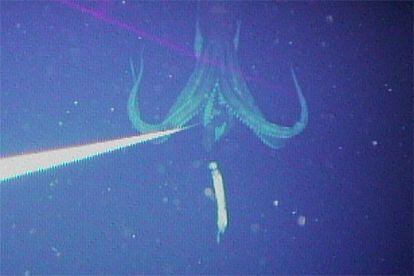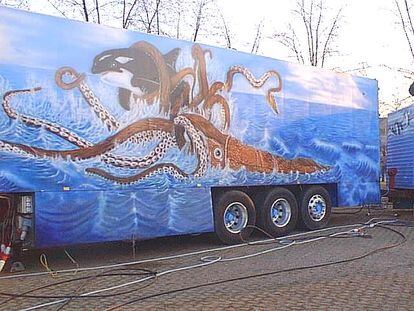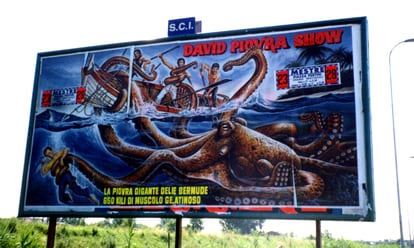Kraken: a sonorous and sinister name that conjures up one of the most terrible legendary creatures created by the human imagination. It is not known for sure what a kraken is, but it is scary just by naming it. There is consensus that it is a sea monster, and a big, huge one. But what it is specifically like is subject to opinions, something related, no doubt, to the fact that few of those who have seen it have survived the incident. It has been identified with Leviathan and with the mythical and gigantic sea serpent. Borges (The book of imaginary beings) gives credence to the species that it would be a magnification of the octopus; but he also picks up the disconcerting idea that floating islands “are always krakens.” For Richard Ellis, who sweeps home his reference book on the daunting and mysterious giant squid (The search for the giant squid), there is no doubt: what is hidden in the myth of the Kraken are stupefied encounters with that wonderful and elusive cephalopod, known to scientists as Architeuthis doge and that can measure 22 meters. The word Kraken would derive from the Norwegian “uprooted tree”, due to its similarity to a squid (Angel Guerra and Ángel F. González point this out in their monograph on the Architeuthis published by the CSIC). We cannot fail to mention the wonderful Kraken rum (Kraken Black Spiced Rum), labeled with a sensational image of the monster and discovered for whoever writes these lines by that tracker of invisible animals and cryptozoologist with a fedora that is Jordi Serrallonga (thanks from here, already your health, Jordi).
This Christmas, and this is the origin of all this, the gift I have given myself is a paradoxically formidable little book, The Kraken breviary, edited by Aventuras Literarias, from Segovia, and which brings together a series of evocative texts about the aforementioned bug with the aim of satisfying our curiosity, but above all to excite our imagination and our sense of the wonderful. A booklet that Borges himself would have loved. It consists of only 90 pages, and yet it submerges us in a shocking way in the wide and turbulent sea of the Kraken. The selection, presented in chronological order and without distinguishing between scientific and literary writings, begins with a text by Pliny the Elder about the polypo, a sea monster with a terrible stench that was difficult to kill with tridents. You can then read a fragment of the saga of Örvar-Oddr that mentions the also aquatic monster Hafgufa (sea mist): “It is the nature of this creature to swallow men and ships, and even whales.” Among the authors summoned is the Danish antiquarian and doctor Olaus Wormius, cited by HP Lovecraft, a master of terror so closely linked to the Kraken. Also in the breviary are the vicar of the Faroes Lucas Jacobson Debes (1623-1675), who identifies the floating islands with the devil, and the Swede Urban Hiärne, who, we are informed in a presentation (all the texts have them and not they have waste), “in 1676 he was part of the national commission that investigated magic and witchcraft, from where he tried to uncover the prejudices and manipulation that led to the burning of Malin Matsdotter as a witch.”
Erik Ludvigsen Pontoppidan, Danish priest and ornithologist, bishop of Bergen and one of the great popularizers of the Kraken, who he puts horns and who informs us that sailors call him, could not be missing. soe-trolden, ”damage from the sea”. Thomas Pennant points out that we should not sail without an ax to cut off the Kraken's arms when it catches us. About Pierre Dénys de Montfort, French malacologist, we are told that his obsession with the Kraken led to discredit and misery. While his compatriot Louis Agustin Guillaume Bose maintains that the Kraken, capable of capsizing a ship as shown very graphically Pirates of the Caribbean: Dead Man's Chest, “It appears to be something more than a cuttlefish.” The pioneer of zoology in Australia, George Shaw, describes the Kraken as a “colossal” cuttlefish, explaining that in an arduous struggle some sailors cut off an arm, thick as a mizzen mast and with suction cups the size of pot lids.
A fragment of The pirate, by Walter Scott, in which the Kraken emerges. “The most enormous of living beings, which rests in the depths of the Northern Ocean.” And Tennyson's poem in which the beast is the protagonist (The Kraken, 1830) and whose verses obviously influenced Lovecraft's Cthulhu: “Far, far below the abyssal sea/, ancient, dreamless, undeterred,/the Kraken sleeps (…)/lies there for centuries, and will lie” . Likewise, there are Melville, Victor Hugo (his octopus is “a viscosity with a will”) and, of course, Jules Verne, Nemo and Ned Land.

However, the best of The Kraken breviary It is accompanied by, included in the same price of 16 euros, a blank notebook – with a striking drawing of a pulpy being on the cover. It is evident that this notebook is a suggestion to write our own history of the Kraken (the editors' favorite seems to be the destruction by sea of the Luarca Giant Squid Center in 2014). So here goes mine, and forgive Verne or Pontoppidan:
I went with my mother to see the Kraken. He was announced as the star of the “great living sea monster show.” The David Show circus, owned by an Italian family from Salerno—Massi Maria and Vittorio Calvaruso, I later learned—was installed with its tent and its large painted caravans in a field on the seafront of Castelldefels, next to the beach, near where my parents lived. It included, according to the dramatic full-color posters, the giant anaconda “terror of the Amazon,” five sharks, “the terrible tropical moray eels,” a group of crocodiles and a large sea lion. It was the afternoon of an October day in 1998 and there was no performance. I had seen the signs and it seemed like a good plan for us to come and look around a little. My mother liked prodigies.

We knocked on the door of one of the caravans and a woman with a child in her arms and matted hair pointed us nonchalantly towards the faded tent. We enter. Scissor chairs were lined up on the dirt floor. A girl appeared with rubber sandals and a bucket full of mussels. Despite her disheveled appearance, she was very beautiful and she smiled mischievously at me. I heard a whistle and turned around: a handsome, wiry young man with greasy bangs was looking at us with inquisitive eyes. I asked if we could take a look at the Kraken, which they enthusiastically introduced as “the piovra [el pulpo] Bermude giant, 650 chilograms of gelatinous muscle, 8 enormous tentacoli”. The young man claimed with a showbiz smile that the Kraken was sleeping and limited himself to pointing to a huge metal box and warning “don't disturb him.” We wouldn't see it without going to the box office. We approached and put our ears: I thought I heard a whisper of suction cups caressing the walls of the cold prison. I thought maybe the Kraken was dreaming a longing dream of broken submarines and dead sailors. He emanated from the box, through small holes that barely allowed us to see murky water and shadows, a smell of saltpeter, fish, ammonia and captive beast. An immense and fearsome presence, tired. A quote from Ray Bradbury came to mind: “Owner of a fragment of eternity in a dark traveling fair.”

We left there. She noticed the mocking look of the Salerno native on her back and in her soul the disappointment and a growing sorrow. I accompanied my mother to her house. “It doesn't matter,” she said with a smile to comfort me. It was one of the last times I saw her, she was already very sick, a cancer that we never talked about. I returned to the beach; On the way I tore off one of the posters of the circus and its monster. I walked to the shore and sat on the sand. I looked over the border kingdom in which the sea purges itself and vomits its portents. There were no stranded leviathans, not even a mass of algae from which a mystery could be inferred. I waited and waited without losing sight of the foam, confident that the fever of the waters would bring forth some miracle. There wouldn't be. When it became night, I got up and let the air blowing from the land carry the circus sign towards the waves.
All the culture that goes with you awaits you here.
Subscribe
Babelia
The literary news analyzed by the best critics in our weekly newsletter
RECEIVE IT
Subscribe to continue reading
Read without limits
_
#Kraken #Christmas #story